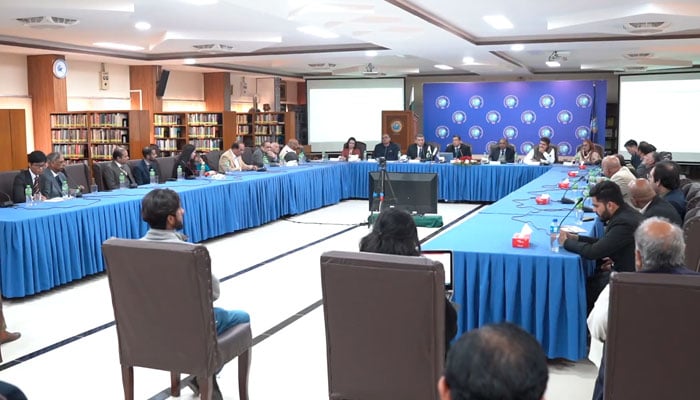Central Asian connectivity termed imperative for next five years
Islamabad : Dr Najam Abbas from East West Institute, Brussels, Belgium, has stressed the Central Asian connectivity's imperative identifying trends and priorities for the next five years, emphasising global freight potential, alternative routes and regional corridors.
Dr Abbas was presenting keynote address at a roundtable on ‘Pakistan's relations with Central Asia and Azerbaijan: imperatives of regional connectivity’ organised here by Institute of Strategic Studies (ISS).
Dr Abbas outlined key points, providing food for thought and encouraging a process of thinking to guide stakeholders in the coming months. He enumerated the importance of understanding emerging conditions changes, and initiatives in the region. He stressed the need to focus on specific trends in connectivity and identified priorities for the next five years, particularly in the context of Pakistan's post-election scenario.
Dr Abbas drew attention to the potential of global freight and logistics, pointing to alternative routes and corridors such as the Middle Corridor and the International North-South Transport Corridor (INTC). He specifically highlighted the significance of connections involving Azerbaijan, Iran and other Caspian nations suggesting that these routes could offer recovery and opportunities for countries facing isolation. He discussed the three routes across the Caspian Sea and their potential impact on Eurasian transportation corridors. He presented figures indicating the substantial growth in the freight potential and asked stakeholders to meet conditions for successful connectivity.
He urged stakeholders to concentrate on elements that either hinder or harness cooperation for enhanced connectivity. The priorities included bolstering development in border regions, promoting knowledge and skill transfers, fostering academic partnerships, supporting local transport entities and cultivating the capacity for diversification.
Prof Shabbir Ahmed Khan, Director Area Study Centre, University of Peshawar, highlighted global shifts towards regional structures, emphasising Pakistan's strategic position and proposing regional connectivity as a vital transit hub. He expressed views on the Middle Corridor and the International North-South Transport Corridor and dilated in detail on feasibility of Pakistan-Afghanistan-CAR corridor.
Former President, Institute of Peace and Diplomatic Studies, Dr Farhat Asif discussed the initiatives undertaken by her institute, focusing on the Belt and Road Initiative (BRI) and establishing trade links with Central Asian countries. She highlighted the challenges faced by businesses, including banking constraints and the need for enhanced information sharing.
Khalid Khan, Chairperson, Central Asian Cellular Forum, said that connectivity sector promises a lot of opportunities. He noted that Azerbaijan became a vibrant state and is producing skilled resource base of IT professionals. He added that Central Asia is a pivotal region with untapped potential. Pakistan needs to join hands with Central Asian republics and Azerbaijan for obvious benefits and dividends. He emphasised the importance of initiating joint ventures to reap benefits from Central Asia’s 10 trillion-dollar market.
Reema Shaukat from the Institute of Regional Studies. said that Central Asian republics and Azerbaijan provide a promising opportunity for engagement. Currently, China and Central Asian republics trade surpasses $70 billion. Earlier, Sohail Mahmood, Director General ISS, welcomed the participants.
-
 Andrew Mountbatten-Windsor In A Fix Over New Disturbing TMZ Photos
Andrew Mountbatten-Windsor In A Fix Over New Disturbing TMZ Photos -
 Eric Dane Opened Up About Releasing His Memoir Just Two Months Before His Death Due To ALS Complications
Eric Dane Opened Up About Releasing His Memoir Just Two Months Before His Death Due To ALS Complications -
 Zendaya, Tom Holland Already Married? Actress Shows Off New Ring
Zendaya, Tom Holland Already Married? Actress Shows Off New Ring -
 King Charles Holds Emergency Meeting After Andrew Arrest: 'Abdication Is Not Happening'
King Charles Holds Emergency Meeting After Andrew Arrest: 'Abdication Is Not Happening' -
 Amazon Can Be Sued Over Sodium Nitrite Suicide Cases, US Court Rules
Amazon Can Be Sued Over Sodium Nitrite Suicide Cases, US Court Rules -
 'Vikings' Star Mourns Eric Dane's Death
'Vikings' Star Mourns Eric Dane's Death -
 Patrick Dempsey Reveals Eric Dane's Condition In Final Days Before Death
Patrick Dempsey Reveals Eric Dane's Condition In Final Days Before Death -
 'Heartbroken' Nina Dobrev Mourns Death Of Eric Dane: 'He'll Be Deeply Missed'
'Heartbroken' Nina Dobrev Mourns Death Of Eric Dane: 'He'll Be Deeply Missed' -
 Andrew Mountbatten-Windsor’s Arrest: What Happened When A Royal Was Last Tried?
Andrew Mountbatten-Windsor’s Arrest: What Happened When A Royal Was Last Tried? -
 Alyssa Milano Expresses Grief Over Death Of 'Charmed' Co-star Eric Dane
Alyssa Milano Expresses Grief Over Death Of 'Charmed' Co-star Eric Dane -
 Prince William, Kate Middleton Camp Reacts To Meghan's Friend Remarks On Harry 'secret Olive Branch'
Prince William, Kate Middleton Camp Reacts To Meghan's Friend Remarks On Harry 'secret Olive Branch' -
 Daniel Radcliffe Opens Up About 'The Wizard Of Oz' Offer
Daniel Radcliffe Opens Up About 'The Wizard Of Oz' Offer -
 Channing Tatum Reacts To UK's Action Against Andrew Mountbatten-Windsor
Channing Tatum Reacts To UK's Action Against Andrew Mountbatten-Windsor -
 Brooke Candy Announces Divorce From Kyle England After Seven Years Of Marriage
Brooke Candy Announces Divorce From Kyle England After Seven Years Of Marriage -
 Piers Morgan Makes Meaningful Plea To King Charles After Andrew Arrest
Piers Morgan Makes Meaningful Plea To King Charles After Andrew Arrest -
 Sir Elton John Details Struggle With Loss Of Vision: 'I Can't See'
Sir Elton John Details Struggle With Loss Of Vision: 'I Can't See'




